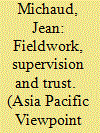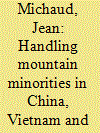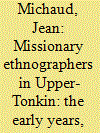|
|
|
Sort Order |
|
|
|
Items / Page
|
|
|
|
|
|
|
| Srl | Item |
| 1 |
ID:
097893


|
|
|
|
|
| Publication |
2010.
|
| Summary/Abstract |
In this research note I reflect upon my different experiences as a researcher with ethnic minorities in Southeast Asia, from my years as a postgraduate student to my current work as a professor. From being a graduate student, to supervising them, I have learned many lessons about graduate fieldwork. Nowadays, I pass these on to supervisees as best I can. I consider it my professional and personal duty to actively warn, inform and prepare young anthropologists about to leave for their masters' and doctoral field research in China, Vietnam and Laos about the field locations to which they are travelling, the political negotiations that they will need to undertake, and the cultural, economic and political differences they will encounter. I also stress that the anthropology that is played out in the field in socialist settings is not necessarily that which we read about in textbooks.
|
|
|
|
|
|
|
|
|
|
|
|
|
|
|
|
| 2 |
ID:
086290


|
|
|
|
|
| Publication |
2009.
|
| Summary/Abstract |
This paper is an overview of issues pertaining to highland minorities in the three socialist countries sharing portions of the Southeast Asian Massif, namely China, Vietnam and Laos. It presents the historical complexity of highland minority policy in these countries. The paper thus depicts prevalent state strategies that aimed, and largely still aim, to handle highland minorities in the most effective and economical way, to ensure that the nation will progress steadily forward. The six current issues of borders and transnationality, taxonomy, indigenous peoples' status, customary land tenure, tourism and environmental issues are then explored critically.
|
|
|
|
|
|
|
|
|
|
|
|
|
|
|
|
| 3 |
ID:
052460


|
|
|
|
|
| Publication |
June 2004.
|
| Summary/Abstract |
Little is known of the contributions of French missionaries to early highland ethnography in the mountainous north of Vietnam (then Tonkin) at the time of colonial contact, a period defined here as 1895-1920. This paper investigates how a handful of men from the Catholic Société des Missions étrangères de Paris contributed significant amounts of text from their postings in remote parts of the Upper-Tonkin (Haut-Tonkin) vicariate, and in some cases Southwest China. A selection of their prose is presented and its ethnographic value appraised, bringing to light the authors in their context as well as the texts themselves. It is assessed in conclusion that, despite their uneven importance as a source for ethnography, these texts nevertheless constitute a unique supply of information on the populations they describe.
|
|
|
|
|
|
|
|
|
|
|
|
|
|
|
|
| 4 |
ID:
114639


|
|
|
|
|
| Publication |
2012.
|
| Summary/Abstract |
In the northern highlands of Vietnam, a very specific official vision of culture is at the core of the modernisation projects of Vietnam Television VTV5 (Ðài Truy?n hình Vi?t Nam), a channel dedicated to educating ethnic minorities, and of the Lào Cai provincial branch of the Ministry of Culture, Sports and Tourism (MCST, B? Van hóa, Th? thao và Du l?ch). These two state institutions jointly organise film screenings - for instance condemning the production and consumption of opium and heroin - in remote villages where they intend to modify cultural practices. These state social actors also produce films that represent what are deemed exemplary minority traditions for public consumption. Our observations of these media processes lead us to suggest that the subjects of these exogenous initiatives are adjusting strategically, activating patterns of quiet resistance to maintain their identities and subvert marginalisation.
|
|
|
|
|
|
|
|
|
|
|
|
|
|
|
|
| 5 |
ID:
147455


|
|
|
|
|
| Summary/Abstract |
In colonial Southeast Asia, the process of enclosure aimed to integrate communities living in the borderlands, along with their lands and resources, into the state project. In 1891, the newly established French colonial administration in Tonkin (northern Vietnam) decided the upland region bordering China should be physically and administratively enclosed to achieve these aims. The governor general ordered the French military to administer these borderlands and to complete two surveys of local ‘tribes’ in 1897–1898 and 1903–1904 to make upland populations and their livelihoods more legible and, the administration hoped, more controllable. By examining details of these surveys, we not only obtain proof of this enclosure project but we also gain rare insight into and a snapshot of upland border livelihoods at the turn of the 20th century. The surveys reveal details regarding local cross-border trade strategies, marketplace manoeuvres, the means by which the colonial government enforced a common currency and, despite such attempts, the enduring nature of barter. We probe how local populations reacted to the state's processes of legibility, and in particular, how upland residents adapted their trade livelihoods to the new realities of being included within the colonial state and, progressively, within the national economy.
|
|
|
|
|
|
|
|
|
|
|
|
|
|
|
|
|
|
|
|
|